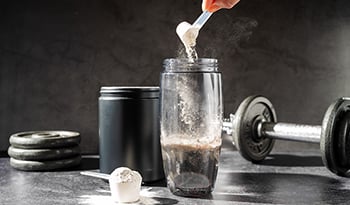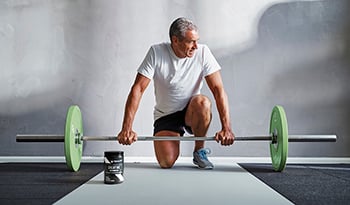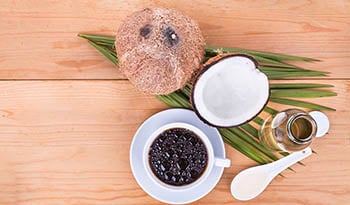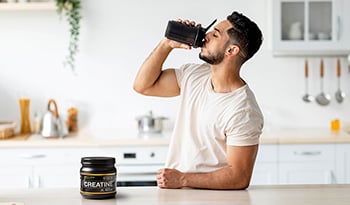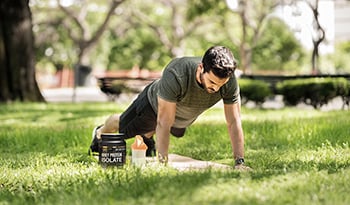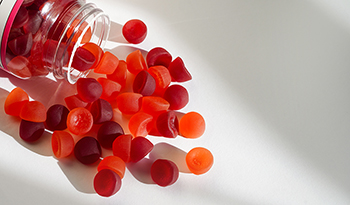Elektrolitli Suyun Faydaları ve Önemi
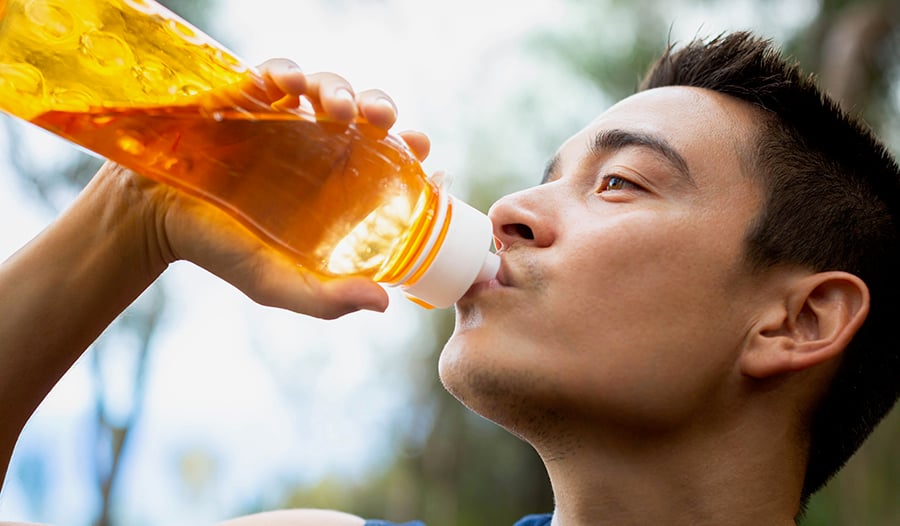
Elektrolitli Su Nedir?
Elektrolitli su, çeşitli vücut fonksiyonlarını düzenlemeye yardımcı olan sodyum, potasyum, kalsiyum ve magnezyum gibi temel mineralleri içerir. Eser miktarda mineral içeren normal suyun aksine elektrolitli su, kayıp elektrolitleri yenilemek için özel olarak tasarlandığından özellikle hidrasyon, kas fonksiyonu ve genel sağlık için fayda sağlar.
Elektrolitler, sıvı dengesinin korunmasında, sinir sinyallerinin iletilmesinde ve kas hareketlerini desteklemede çok önemli bir rol oynayan yüklü minerallerdir. Yeterli elektrolit olmadan vücudumuz; kramp, yorgunluk, baş dönmesi ve hatta aritmi veya nöbet gibi ciddi sağlık komplikasyonları yaşayabilir.1
Elektrolitli su sporcular, iyileşme sürecindeki hastalar ve aşırı sıcağa veya fiziksel zorlamaya maruz kalanlar tarafından yaygın olarak kullanılır. Vücut ter, idrar ve diğer yollarla attığı elektrolitleri yenilemeli ve işlevlerini sürdürmeye devam etmelidir.
Elektrolitli Suyun Faydaları
Elektrolitler çok sayıda fayda sundukları için elektrolitli su günlük hidrasyon anlamında vücuda değerli bir katkı sunar. Aşağıda vücuttaki elektrolitlerin önemli işlevlerinden bazılarını bulabilirsiniz:
Hidrasyon
Elektrolitler vücudun suyu tutmasına yardımcı olarak hidrasyonun hücresel düzeyde etkili olmasını sağlar. Bu özellikle sporcular, sıcak iklimlerde yaşayanlar ve tedavi sürecinde olanlar için önemlidir. Uygun hidrasyon enerji seviyelerini, bilişsel işlevi ve genel vücut zindeliğini doğrudan etkiler.
Normal suyun aksine, elektrolitli su vücutta optimum sıvı dengesinin korunmasına yardımcı olarak aşırı hidrasyon veya dehidrasyonun önüne geçer. Bu, özellikle uzun süreli fiziksel aktivitede bulunan insanlar için faydalıdır çünkü aşırı terleme temel minerallerin kaybına yol açabilir.
Sıcak Çarpmasını Önler
Aşırı sıcak veya yoğun egzersiz sırasında, vücut ter yoluyla su ve temel mineralleri kaybeder. Elektrolitli su, atılan bu mineralleri yenileyerek dehidrasyonu, ısı bitkinliğini ve sıcak çarpmasını önlemeye yardımcı olur.
Sıcak çarpması, vücudun ısı düzenleme sisteminin aşırı ısı ve sıvı kaybı nedeniyle bozulması anlamına gelir. Belirtiler arasında kafa karışıklığı, hızlı kalp atışı, baş dönmesi ve bayılma bulunur. Sıcak çarpması tıbbi müdahale ve bakım gerektiren acil bir durumdur. Yüksek sıcaklıklarda elektrolitli su içmek bu tehlikeli koşulların önlenmesine yardımcı olabilir.
Kas Fonksiyonunu Destekler
Sodyum, potasyum ve magnezyum, kas kramplarını ve spazmlarını önlemek için birlikte çalışır. Elektrolitli su içmek egzersiz sonrası ağrıyı azaltmaya ve fiziksel performansı artırmaya yardımcı olabilir.2
Düzenli egzersiz yapan sporcular ve bireyler, dayanıklılığı desteklemek, yorgunluğu önlemek ve kas iyileşmesini hızlandırmak için genellikle elektrolitli suya güvenirler. Düşük elektrolit seviyeleri istemsiz kasılmalara ve zayıflığa neden olabilir.3
Kalp Sağlığı
Elektrolitler, kalbin ritmi de dahil olmak üzere uygun sinir sinyallerini ve kas hareketlerini koruyarak kalp sağlığında rol oynar. Elektrolit dengesizliği düzensiz kalp atışlarına, yüksek tansiyona veya diğer kardiyovasküler sorunlara yol açabilir.4
Elektrolit dengesinin korunması, kalbin verimli çalışmasını sağlayarak kalp hastalığı ve diğer ilgili komplikasyon risklerini azaltır.
Kan Basıncını Düzenleme
Potasyum ve sodyum vücuttaki sıvı seviyelerini dengeleyerek kan basıncını normal düzeyde tutar. Bu dengeyi korumak, hipertansiyon ve kardiyovasküler hastalık riskini azaltır.
Elektrolit dengesizlikleri, özellikle aşırı sodyum alımı, yüksek tansiyona neden olabilir. Öte yandan potasyum, daha sağlıklı bir dolaşım sistemini teşvik ederek sodyumun etkilerini önlemeye yardımcı olur.5
Sinir Fonksiyonu
Kalsiyum, potasyum ve sodyum sinir iletişimi için gereklidir. Uygun elektrolit seviyeleri, sinir uyarılarının sorunsuz bir şekilde gerçekleşmesini sağlarken kas hareketlerinden bilişsel işlevlere kadar tüm vücut fonksiyonlarına etki eder.
Elektrolitlerdeki dengesizlik beyin sisi, karıncalanma hissi ve yavaşlayan refleksler gibi semptomlara neden olabilir.
Elektrolitli Suyun Riskleri
Elektrolitli suyun çok sayıda faydası olmasına rağmen aşırı tüketimi aşağıdakiler de dahil olmak üzere bazı sağlık risklerine yol açabilir:
- Çok fazla sodyum: Aşırı sodyum alımı kan basıncını artırabilir, su tutulmasına katkıda bulunabilir ve şişkinliğe neden olabilir.
- Çok fazla potasyum: Yüksek potasyum seviyeleri (hiperkalemi) düzensiz kalp atışlarına, kas güçsüzlüğüne ve sinir sorunlarına neden olabilir.
- Aşırı hidrasyon: Vücutta elektrolit yenilenmesine gerek olmadığı halde aşırı miktarda elektrolitli su içmek, dengesizliğe yol açabilir. Bu durum kafa karışıklığı, baş dönmesi ve mide bulantısı gibi olası sağlık sorunlarına yol açabilir.
Kimler Elektrolitli Su İçmeli (Kimler Kaçınmalı)?
Elektrolitler özellikle aşağıdakiler için faydalıdır:
- Sporcular: Uzun süre veya sıcak ve kuru havalarda yorucu egzersiz yapan kişiler, ter yoluyla kaybedilen elektrolitleri yenileyerek fayda sağlayabilir. Unutmayın, çoğu insan yaklaşık 75 dakikadan az süren hafif ila orta dereceli egzersizler için elektrolit takviyesine ihtiyaç duymaz.6
- Hastalar: Hastalık sırasında rehidrasyon, özellikle kusma veya ishal yaşarken iyileşmeye yardımcı olabilir.
- Sıcak ve nemli iklimlerde yaşayanlar: Sıcak havalarda aşırı terleme elektrolit yenileme ihtiyacını artırır. Bu özellikle açık havada uzun saatler çalışan insanlar için önemlidir.
Her gün elektrolitli su içmenin uygun olup olmadığını merak ediyor olabilirsiniz. Genellikle günlük olarak elektrolitli su tüketmek güvenli olsa da, her şeyde olduğu gibi ortayı bulmak gerekir. Gıda kaynaklarından yeterince mineral içeren dengeli bir diyet tüketen insanlar her gün elektrolitli suya ihtiyaç duymayabilir.
Elektrolitli İçecek Tarifleri
Önceden hazırlanmış elektrolitli içecekleri satın almak mümkün. Alternatif olarak bunu evde kendiniz de yapabilirsiniz. Üstelik yapımı hem kolaydır hem de maliyeti daha uygundur. İşte kişisel tercihlerinize göre uyarlayabileceğiniz basit bir elektrolitli içecek tarifi:
Ev Yapımı Elektrolitli İçecek
Malzemeler:
- 2 su bardağı su
- 1⁄2 çay kaşığı deniz tuzu
- 1⁄4 çay kaşığı kabartma tozu
- 1 yemek kaşığı bal veya akçaağaç şurubu
- 1⁄2 su bardağı taze portakal veya limon suyu
Yapımı:
- Tüm malzemeleri bir bardak veya şişede bir araya getirin.
- Eriyene kadar karıştırın veya çalkalayın.
- Hidratlı kalmak için gerektiği kadar için.
Daha fazla elektrolit içeceği ve adrenal kokteyl tarifi için bu makaleye göz atabilirsiniz.
Elektrolitli Su ve Normal Su
Normal suyun size yetip yetmeyeceğini ve elektrolitli suya ihtiyacınız olup olmadığını merak ediyor olabilirsiniz. Düzenli su tüketimi, çoğu insan için yeterli olacaktır ancak elektrolitli su, özellikle yoğun fiziksel aktivitede bulunan, hastalık geçiren veya aşırı terlemeye maruz kalan kişiler için fayda sağlar. Kayıp mineralleri yenileyerek normal suyun ötesinde ek hidrasyonla beraber vücut dengesine katkı sunar.
Genel kural olarak, 75 dakikadan uzun süre orta ila yüksek yoğunluklu egzersiz yapıyorsanız veya uzun süre sıcak havalarda dışarıda kalıyorsanız, elektrolitli su sizin için ideal bir seçim olacaktır. Aynı şekilde, kusma veya ishal belirtileri gösteriyorsanız, elektrolitli su normal sudan daha etkili bir şekilde vücudunuza etki eder.
Elektrolitlerle En İyi Hidrasyon
Elektrolitli su; hidrasyon, kas fonksiyonu ve genel sağlık için önemli rolü olan sodyum, potasyum, kalsiyum ve magnezyum gibi minerallere sahiptir. Sporcular, tedavi sürecindeki hastalar veya yalnızca susuzluğu etkin şekilde gidermek isteyen kişiler için elektrolitli suyu rutine eklemek fark yaratacaktır.
Referanslar:
- Elektrolitler- StatPearls - NCBI Kitaplık. Erişim tarihi: 6 Şubat 2025.
- Orrù S, Imperlini E, Nigro E, vd.Fonksiyonel İçeceklerin Spor Performansı ve İyileşme Üzerindeki Rolü. Besinler. 2018; 10 (10): 1470.
- Miller KC, McDermott BP, Yeargin SW, Fiol A, Schwellnus Milletvekili.Egzersizle İlişkili Kas Kramplarının Patofizyolojisi, Tedavisi ve Önlenmesinin Kanıta Dayalı İncelemesi. J Athl Treni. 2021; 57 (1) :5.
- Bennett J, Deslippe AL, Crosby C, Belles S, Banna J.Elektrolitler ve Kardiyovasküler Hastalık Riski. Am J Lifestyle Med. 2020; 14 (4) :361.
- Huang L, Li Q, Wu JHY, vd. Tuz İkamesi ve İnme Çalışması adlı araştırmada gözlemlenen tansiyon düşüşüne katkı veren sodyum azaltılması ve potasyum artırımı . J Hum Hypertens. 2024; 38 (4) :298.
- Elektrolitler vücudu destekleyebilir ancak aşırıya kaçmamaya çalışın| Amerikan Kalp Derneği. Erişim tarihi: 9 Şubat 2025.
FERAGAT:SAĞLIK MERKEZİ tanı koymayı hedeflememektedir...
















































































 İçindekiler
İçindekiler






